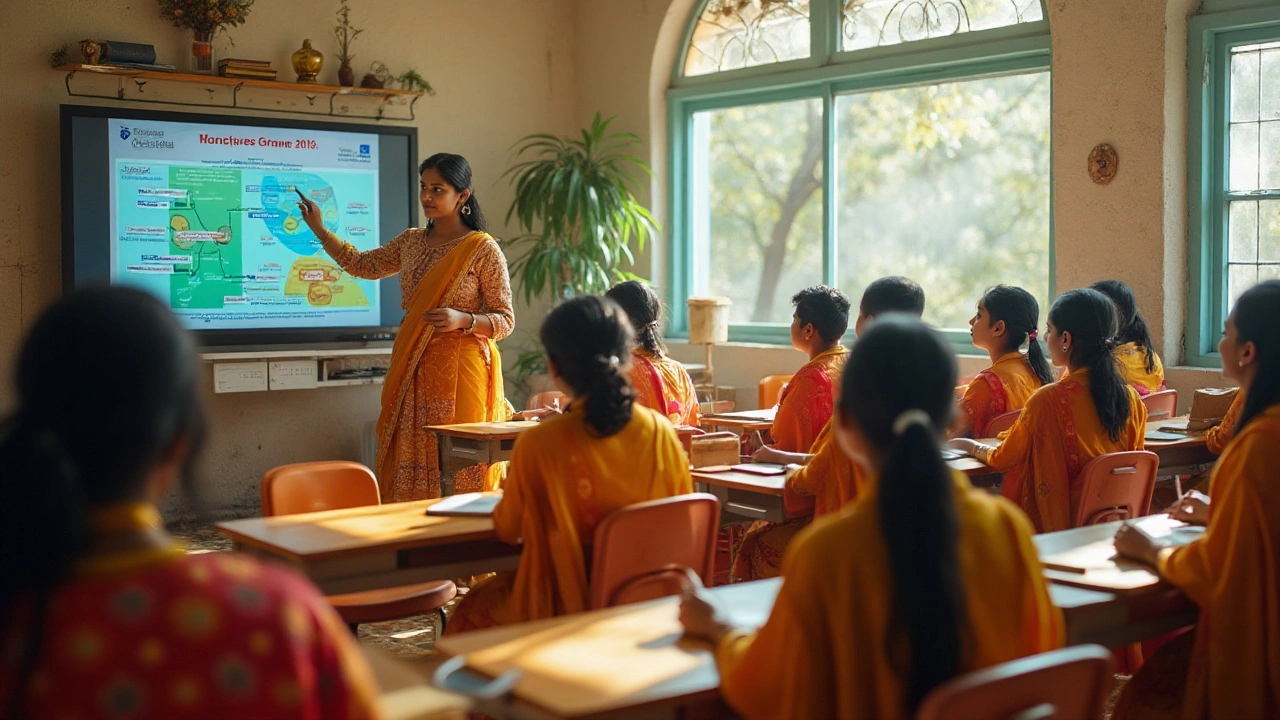Guide to Achieving a Teaching Certificate in Virginia

For those with a passion for education and a desire to teach in Virginia, understanding how to obtain a teaching certificate is a crucial first step. Virginia requires prospective teachers to meet certain educational and testing benchmarks, ensuring that educators are well-prepared for the classroom environment.
Many routes are available for aspiring educators, whether they are recent graduates or professionals seeking a career shift. This flexibility allows individuals to tailor their path according to their previous education and experience. From choosing the right teacher preparation program to navigating the certification process, this guide provides all the essentials for getting started on your teaching journey in Virginia.
- Understanding Licensure Requirements
- Educational Prerequisites
- Approved Teacher Preparation Programs
- Examination and Testing
- Submitting Your Application
- Alternative Routes and Continuing Education
Understanding Licensure Requirements
Stepping into a teaching career in Virginia involves meeting specific licensure requirements set forth by the Virginia Department of Education. These requirements are in place not just to ensure educators possess the necessary skills and knowledge, but also to maintain a high educational standard across the state. The path to obtaining your teaching certificate is a structured one and knowing its details is crucial for success. Licensure typically involves several essential components, including education, exam scores, and sometimes even years of experience or special training if you are coming from out of state. In Virginia, licensure is designed to be rigorous and comprehensive, ensuring that students receive a robust and consistent educational experience across all public schools.
One of the fundamental steps in acquiring a teaching license in Virginia is completing an accredited degree program. Most prospective educators pursue a bachelor's degree in education, but depending on your interests, degrees in specific content areas such as math, science, or English are also suitable given they include appropriate teacher preparation content. Importantly, these degree programs should be accompanied by student teaching experiences, which are integral for hands-on learning and professional practice. Successfully navigating this phase not only strengthens your understanding of educational theories and practices but equips you with real classroom management skills essential for inspiring and educating students.
After fulfilling educational prerequisites, the next vital step involves passing the necessary Praxis examinations. These standardized tests assess both basic skills and content knowledge relevant to your teaching area. Virginia often requires the Praxis Core Academic Skills for Educators tests, focused on reading, writing, and mathematics. Additionally, the Praxis Subject Assessments evaluate your understanding and capabilities in specific subjects you would like to teach. These exams are designed to ensure that all licensed teachers not only have foundational academic skills but also subject-specific expertise needed to effectively teach and engage students in those areas. This rigorous testing framework aligns with the state's vision to nurture adept and knowledgeable educators capable of meeting diverse learning needs.
Moreover, once you pass your Praxis exams, you must complete a state-approved teacher preparation program. Programs in Virginia are offered through various universities and colleges and incorporate both coursework and practical teaching components. These programs are structured to provide a blend of classroom theory and practical application, often requiring candidates to complete a certain number of supervised teaching hours under a licensed teacher. This immersive experience is invaluable as it provides insights into the day-to-day operations and challenges of teaching, thus bridging the gap between theoretical knowledge and classroom reality.
Finally, all future educators must submit a comprehensive application to the Virginia Department of Education, along with payment for processing and verification of all completed requirements. This step often includes submitting transcripts, exam scores, and any additional documents that attest to your readiness to enter the teaching profession. The application process necessitates attention to detail and patience, as ensuring all documents are correctly completed and submitted is crucial to avoid unnecessary delays or complications in achieving licensure. Through careful preparation and understanding of these licensure requirements, aspiring educators can confidently take their place in Virginia's vibrant and diverse educational landscape, prepared to make a positive impact on students' lives.
Educational Prerequisites
Embarking on the path to earning a teaching certificate in Virginia entails meeting specific educational prerequisites, which constitute the foundation upon which your teaching career will be built. Virginia, like many states, has set these prerequisites to ensure that aspiring educators possess the necessary knowledge and skills before entering the classroom. At a minimum, applicants must have a bachelor’s degree from a regionally accredited institution. This degree not only signifies that the individual has received a broad, general education but also that they have a concentration in a teaching field.
Prospective teachers should focus on their chosen subject areas during their undergraduate studies. Specializing in subjects such as English, mathematics, science, or history can be advantageous, as public schools often seek teachers in these high-demand areas. Those wishing to teach at the elementary level may major in elementary education or a related field. It’s important to align your academic background with the specific grade level or subject you intend to teach, which can enhance both your marketability and effectiveness as an educator.
In addition to a bachelor's degree, educational prerequisites may include specific coursework related to education. Many teacher preparation programs require courses in educational psychology, classroom management, and pedagogy. These courses are designed to equip future teachers with the frameworks needed to manage a classroom effectively and to understand the developmental stages of their students. Interestingly, as a historical note, Virginia has emphasized the inclusion of courses on ethics and cultural competency, reflecting the state's commitment to producing educators who can nurture a respectful and inclusive classroom environment.
As noted by the Virginia Department of Education, having "a strong foundational knowledge of teaching principles" is critical for entry into its teacher preparation programs.
"Future educators must be able to adapt to the diverse learning needs of students," the Department highlights, demonstrating the importance of well-rounded preparation.Additionally, online self-paced courses and workshops are becoming increasingly popular, providing flexible opportunities to fulfill these prerequisites.
The process of becoming certified also mandates passing standardized tests that assess both basic skills and subject-specific knowledge. Aspiring educators are required to demonstrate proficiency in fundamental areas such as mathematics and literacy before they can proceed to more specialized testing. This step is crucial, as it assures educational institutions that candidates possess the requisite skills to both understand and communicate their area of expertise effectively.
Teacher training programs in Virginia often list comprehensive details about these prerequisites on their websites, including whether any additional courses are necessary depending on the teaching field. Checking these resources early in your academic journey can guide course selections and extra-curricular engagements, making you a more compelling candidate when seeking certification. Navigating these prerequisites effectively lays a solid foundation, preparing aspiring teachers to meet the challenges and joys of shaping young minds in the Commonwealth of Virginia.

Approved Teacher Preparation Programs
Embarking on a journey to become a licensed teacher in Virginia often involves enrolling in one of the many Approved Teacher Preparation Programs that the state endorses. These programs are designed to equip future educators with the pedagogical skills and subject matter expertise they need to thrive in a classroom setting. Typically housed within colleges and universities, these programs provide a structured blend of theoretical learning and practical teaching experience. Aspiring teachers will find a plethora of choices, each offering unique specializations ranging from early childhood education to secondary school focus areas. Choosing the right program significantly impacts your teaching career, as it lays the groundwork for your methods, instructional strategies, and classroom management techniques.
The process of choosing an appropriate program begins with identifying which institutions offer state-approved courses. In Virginia, renowned institutions like the University of Virginia, Virginia Commonwealth University, and James Madison University are known for their rigorous and comprehensive preparation tracks. Such programs require candidates to not only delve into subject-specific coursework but also engage in student teaching under the supervision of veteran educators. This hands-on experience is invaluable, as it exposes candidates to real-world classroom dynamics and teaching challenges that cannot be fully replicated through textbooks alone.
Each program has its unique prerequisites and admission criteria, which potential candidates need to meet. Typically, these include a bachelor's degree, a minimum GPA, and the completion of certain foundational courses. Some candidates might find the Graduate Record Examinations (GRE) or the Miller Analogies Test (MAT) listed among the requisites, especially for master's level training programs. These entrance requirements are set to ensure that entrants possess the foundational skills necessary to build effective teaching expertise. As you consider your options, remember to weigh factors like program length, areas of focus, and the support systems available to students. Talking to current enrollees or program graduates can provide valuable insights into what you can expect.
"The most important part of the teacher preparation program is the real-life classroom experience—being able to apply what you've learned in a live setting with real students," shares a recent graduate of a Virginia teaching program. This firsthand experience allows candidates to refine their teaching philosophies and adapt to diverse educational environments.
Once enrolled, students typically go through a core curriculum that encompasses educational psychology, instructional technology, diversity in education, and assessment strategies. Such courses are integral to developing the broad skill set required by modern educators. Additionally, these programs often include specialized seminars and workshops that address the latest advances in education technology, classroom inclusion techniques, and the integration of digital resources. Emphasizing the teaching certificate pathway, Virginia encourages continuous interaction with peers and faculty, fostering a collaborative learning environment. This networking can be crucial for professional growth and job placement post-certification.
For those who have attained an out-of-state teaching certificate, Virginia offers a route for certification compatibility. Candidates can transfer their credentials, provided they have completed an equivalent state-approved program elsewhere. Virginia's reciprocity agreements are a testament to the commitment to high-quality education standards and the flexibility to welcome educators from varied backgrounds. Always verify the specific components with the Virginia Department of Education to ensure you meet all necessary criteria before submitting your application.
Examination and Testing
To secure a teaching certificate in Virginia, aspiring educators must navigate a rigorous testing process designed to assess their readiness and competence. The cornerstone of this process is the successful completion of the Virginia Communication and Literacy Assessment (VCLA), a requirement for all prospective teachers. The VCLA evaluates essential skills in reading and writing, ensuring that candidates possess a proficient command of the language to effectively engage with students and colleagues alike.
Alongside the VCLA, the Praxis subject assessments play a critical role in evaluating specialized knowledge across various disciplines. Candidates intending to teach a specific subject must pass the corresponding Praxis tests to demonstrate their expertise in that area. For instance, an aspiring mathematics teacher must display a robust understanding of mathematical concepts by clearing the relevant Praxis examination.
The Early Childhood Professional Licensure Assessment is another component for those pursuing a license in early childhood education. This test focuses on the unique skills and knowledge required to nurture young learners and establish a strong educational foundation. By examining instructional strategies, child development, and age-appropriate learning resources, the assessment ensures educators are prepared for the nuances of early childhood teaching.
It's important to note the reciprocity agreements existing between Virginia and other states, which can simplify the certification process for out-of-state teachers. These agreements can sometimes allow educators to sidestep certain tests if they have already demonstrated proficiency elsewhere. However, this often depends on the specific circumstances and may vary from case to case.
"Following a meticulous approach to examinations not only upholds the quality of education but also instills confidence in educators navigating the rigorous standards set by the state." - Virginia Department of Education
Preparation for these tests is crucial, and candidates are encouraged to take advantage of the multitude of resources available. Study guides, professional courses, and practice exams are widely accessible to help educators brush up on required knowledge and skills. Moreover, collaboration with peers in study groups can provide additional support and insights, turning the examination phase into a more manageable collective endeavor.

Submitting Your Application
Once you have navigated through the complexities of obtaining the necessary education and passing the required examinations, the next significant step in becoming a certified educator in Virginia involves the actual submission of your teaching application. This process, while straightforward in its directive, holds a pivotal role in finalizing your journey to secure a teaching license. Ensuring that all documents and required materials are meticulously organized and submitted can often make the difference in how seamlessly your application is processed.
Before you begin, it is crucial to gather key documents that reflect your eligibility. These will typically include official transcripts that detail your academic history, along with proof of completion from an approved teacher preparation program. It is often wise to confirm that your transcripts and preparation programs meet all standards as laid out by Virginia's Department of Education. Accompanying this documentation, you will need to submit your scores from mandated examinations, tailored to the specific requirements of your intended teaching area. This stage leaves little room for error, and any discrepancies can lead to significant delays.
At this point, you will need to complete the state's application form. While it sounds straightforward, ensure that every section is duly completed, with no fields left unaddressed unless explicitly instructed otherwise. Some teachers applying for alternative certification routes might have to provide additional documentation, a fact that underlines the importance of reading the guidelines meticulously. Delving deeper, you'll find that Virginia encourages electronic submissions over traditional postal mail, offering a more streamlined and environmentally conscious approach. Not only is this method quicker compared to its paper-based counterpart, but it also allows for easier follow-ups and status tracking.
According to Johns Hopkins University, "Digital submissions can significantly reduce processing times and allow for quicker feedback from state boards." This is a point well taken given the high volume of applications processed each year. Opting for electronic submission can also facilitate immediate confirmation of receipt, giving applicants peace of mind that their diligent efforts are acknowledged.
When reviewing your application and accompanying documents, consider involving a mentor or colleague who has successfully navigated the process. They might provide insights or pick up on overlooked details that could enhance your submission's effectiveness. Virginia's Department of Education also often updates its guidelines, which makes checking the latest notifications a crucial step before hitting the submit button. Keep a digital copy of all your submissions for your personal records, just as a safety net.
In certain cases, applicants might have to make small corrections or adjustments post-submission. While such requests can initially seem daunting, they provide an opportunity to perfect the application rather than seeing it outright rejected. Ensuring open lines of communication with the board during this period can greatly expedite any necessary amendments. Be dutiful in adhering to any feedback received, and respond within stipulated timelines to facilitate smooth progression toward your goal of securing a teaching certificate.
Alternative Routes and Continuing Education
The path to obtaining a teaching certificate in Virginia doesn't always follow a traditional trajectory. In fact, the state has designed several alternative routes to accommodate a diverse range of aspiring educators. These pathways provide opportunities for individuals from various professional backgrounds to transition into teaching, often bringing valuable real-world experiences into the classroom.
One prominent alternative is the Career Switcher Program. This innovative initiative is tailored for professionals who hold at least a bachelor's degree and possess work experience outside of the education sector. The program typically spans over a year and includes intensive training, mentorship, and ongoing professional development. Participants in the Career Switcher Program often find the transition smooth, as the curriculum emphasizes practical teaching skills alongside pedagogical theory.
Virginia also recognizes the need for specialized educators in certain subject areas. To address this demand, the state offers provisional licensure opportunities for individuals with expertise in fields like mathematics, science, and special education. Provisional licenses allow teachers to enter the classroom more rapidly while simultaneously completing necessary educational requirements. This approach not only fills critical teaching gaps but also supports educators in gaining valuable hands-on experience.
Continuing education is a vital component of maintaining and enhancing teaching proficiency. Virginia emphasizes lifelong learning for its educators, requiring them to engage in professional development activities to renew their licenses. These activities may include workshops, online courses, or advanced degree programs. By participating in continuing education, teachers stay abreast of the latest educational trends and methodologies, ensuring a high-quality learning experience for their students.
In addition to structured programs, Virginia encourages a culture of mentorship and collaborative learning among educators. Engaging with peer networks and participating in professional organizations can provide teachers with fresh perspectives and support systems. As noted by respected educator Dr. John Meadows,
“Continuous professional learning is essential not only for personal growth but also for fostering the academic success of every student in the classroom.”The state understands that teaching is a dynamic profession, one that requires constant adaptation and reflection.
Moreover, data suggests that teachers engaged in regular professional development exhibit higher levels of job satisfaction and effectiveness. A study conducted by the Virginia Education Association revealed that educators who partook in at least 50 hours of annual professional training were 25% more likely to report job fulfillment compared to their peers with less training.
Ultimately, whether entering the profession through an alternative route or advancing one's skills through continuous learning, educators in Virginia have multiple avenues to explore. These opportunities are crafted to ensure that every teacher, regardless of how they start their career, is equipped to provide exceptional educational experiences for their students.
Write a comment